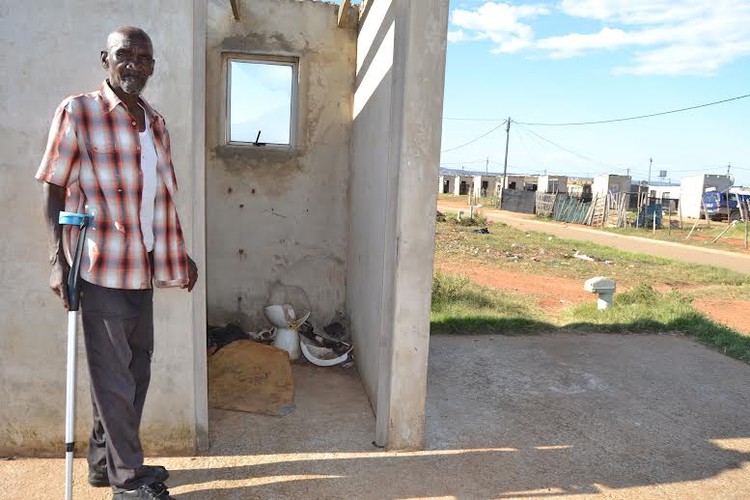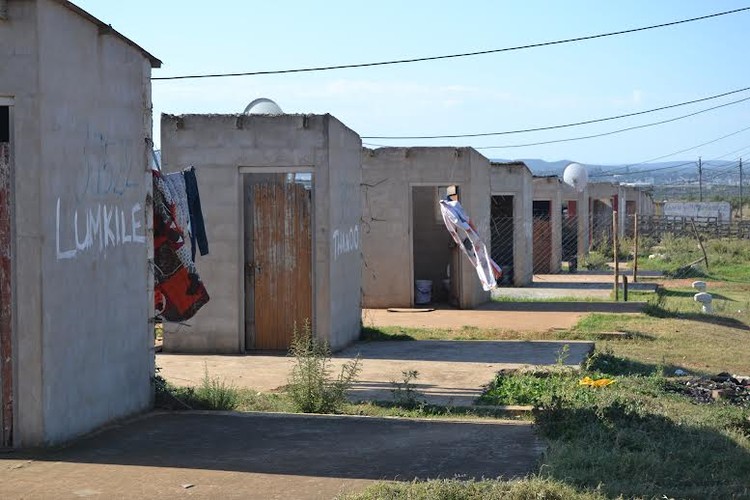300 toilets were built on this site seven years ago. Now at last the promised houses may be built around them
Families are still living in shacks next to their broken toilets
Andile Ndulula has been waiting for the house to be built around his toilet for seven years. Photos: Thamsanqa Mbovane
Andile Ndulula, who uses crutches, is among 300 Kariega families who have been living in shacks next to toilets for seven years, waiting for the houses to be built around them.
“When it rains, I carry an umbrella inside a toilet to relieve myself, because it has no roof,” Ndulula told GroundUp last week at his shack in Gunguluza.
“I arrived here in 2016 and I have been living in a shack next to a broken-down toilet. The toilet with no roof is my neighbour’s. Mine has no seat, roof or door.” he said.
The families, mainly orphans, backyard dwellers, disabled people and elderly people, came from Taliban and Joe Modise in wards 45, 46, 47, and from hostels in wards 44 where the toilets are situated. In 2013 the ANC-led municipality built 300 toilets but no houses. In April 2017, the DA-led municipality moved 100 people to live next to the 300 toilets as part of a “bucket system eradication programme”. It was also intended that residents could stop further damage to the already badly vandalised toilets, which were missing doors, roofs, toilet seats and windows. A dozen families began erecting shacks next to the toilets and the settlement grew. Since then, nothing has happened.
The toilets were built but the houses are still to come.
Nelson Mandela Bay Mayoral Committee Member for Human Settlements, Tukela Zumani, told GroundUp that the project, built by the Coega Development Corporation (CDC) “was disrupted due to vandalism of those structures and the beneficiaries have been living in informal structures on the 300 sites.”
He did not explain why nothing had happened since, but now, he told residents during a visit last week, the project is to be relaunched.
His colleague, Thembakazi Hlela, who manages the 156 informal settlements in the city, said that through engagements with the provincial department of Human Settlements, the project has been revived and the construction of houses is to take place in the 2023-2024 financial year.
When GroundUp asked the municipality for further details, we were referred to the CDC, which referred us to the provincial Department of Human Settlements. Siyabonga Mdodi, spokesperson for the MEC, did not give a deadline for completion of the houses.
Support independent journalism
Donate using Payfast

Next: Learners at KZN special schools return to class after boycott
Previous: Durban flood victims accuse government of not keeping its promises
© 2023 GroundUp. This article is licensed under a Creative Commons Attribution-NoDerivatives 4.0 International License.
You may republish this article, so long as you credit the authors and GroundUp, and do not change the text. Please include a link back to the original article.
We put an invisible pixel in the article so that we can count traffic to republishers. All analytics tools are solely on our servers. We do not give our logs to any third party. Logs are deleted after two weeks. We do not use any IP address identifying information except to count regional traffic. We are solely interested in counting hits, not tracking users. If you republish, please do not delete the invisible pixel.


